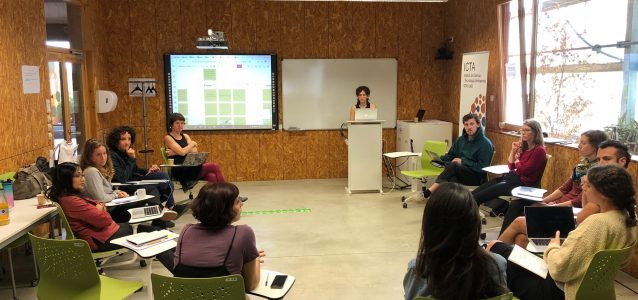The concept of climate justice has been gaining traction for some time. Broadly speaking, climate justice is about taking a human- and equity-centred approach to thinking about climate risks, responsibilities and potential responses. Like many other big concepts, climate justice is often proposed as important for climate action without careful and critical thought about what this should actually involve. If we are not careful, climate justice will become yet another empty vessel that adds a progressive spin to the many climate-related plans, which are already packed with lofty ideas.
I found myself in Barcelona (Spain) at the end of October 2022, surrounded by the brilliant minds of those working at the Barcelona Laboratory for Urban Environmental Justice and Sustainability (BCNUEJ) with two other invited panellists. We spent two days asking questions related to what urban climate justice means and how we might adopt feminist and/or intersectional approaches to truly advance a just climate agenda. The workshop kicked off with some ideas shared by us panellists. Malini Ranganathan spoke about climate justice through a Feminist Ethics of Care and Radical Histories of Abolition and Maria Rodó-Zárate’s intervention focused on the geographies of intersectionality and the importance of emotion across different spaces.
Malini has written extensively on the need to engage more critically with mainstream climate concepts such as “resilience”, which often focus on external climate hazards and techno-managerial fixes (e.g. urban greening) without considering “historical drivers of precarity and place-based genealogies of activism”. Maria has not previously worked in the climate field but is a prominent LGBTAIQ+ activist in Barcelona who engages deeply with intersectionality theory. Her activist-academic work explores the geographical dimensions of intersectionality; how experiences of comfort and discomfort vary across different physical and social spaces.
I offered insights from the perspective of someone who has worked with mainstream climate risk, vulnerability, adaptation and resilience concepts to co-produce knowledge through transdisciplinary research and is trying to move towards more intersectional perspectives in this work. I’ve been collaborating with an inspirational, diverse team to develop some ideas in line with this, which I shared during my presentation. These are centred intersectionality as a core principle and approach to enable “more profound analyses of social relations of exclusion” particularly related to climate risk and the experiences of climate adaptation*. The workshop provided an opportunity to hear about the inspiring and expansive work that is being done by researchers at BCNUEJ at various stages of their careers, much of which supports activism in Barcelona and other environments across Europe (https://www.bcnuej.org/about/). We also visited several sites across Barcelona, in which BCNUEJ researchers have engaged activists, city government and other non-academic actors to better understand challenges, contentions and opportunities associated with urbanisation and other processes of change relevant to the city.
The diversity of experiences, topics, working contexts and career stages across the group supported rich and stimulating conversations on urban climate justice from various perspectives. We surfaced several key themes, which we hope to continue unpacking collaboratively as we move back into our own work rhythms around the world.
We spoke about the challenges of trying to draw on theory that has been developed outside of a particular context when working towards urban climate justice. For example, while centring issues of racism are key to advancing urban climate justice (we also reflected on how little this is done), critical race theory is rooted in the United States and there is a need to theorise racism in relation to other environments and processes of knowledge co-production.
We spoke about the importance of feminist ethics (ethics of care) while doing research with activists and other non-academic groups, and how feminist perspectives should inform the content of activist research on urban climate justice alongside methods and approaches. Such approaches must consider epistemic justice and ask critical questions related to whose knowledge counts while problematising climate-related risks and considering responses. We challenged the conceptual linkages and dichotomies of different spaces (e.g. the urban-rural divide).
Motivated by Maria’s work, we reflected on the need to advance urban climate justice theory through an intersectional perspective (e.g. considering structural, political and representational intersectionality) and other critical theories (e.g. queer political theory).
We emphasised the importance of intersectional coalitions for climate justice and discussed the need to deeply consider emotional experiences relevant to climate risk, as well as how these dimensions of risk might speak to natural sciences and vice versa.
The conversations that happened over the two-day workshop reinforced ideas that have been sitting with me for some time – there is a need to adopt more activist, critical and caring approaches to climate research that centre residents whose lives have been (and continue to be) shaped by discrimination and prejudice, and who are likely to be disproportionately affected by climate variability and change. Climate justice is more imperative than ever here in South African cities where many urban residents continue to be marginalised and, in many cases, forgotten. The themes described above provide some initial ideas for keeping a critical eye on the urban climate justice agenda, but this is by no means definitive.
As Malini so accurately summarised towards the end of our event, climate justice is about a deep engagement with context and experience – a sentiment that can be progressed along many lines. I am extremely grateful to my new friends at the BCNUEJ for inspiring and enabling this important discussion, which I look forward to deepening and expanding.
Photo taken by Ana Terra Amorim-Maia
*Castán, V., And, B., & Neves Alves, S. (2018). Intersectionality challenges for the co-production of urban services: notes for a theoretical and methodological agenda. https://doi.org/10.1177/0956247818790208
